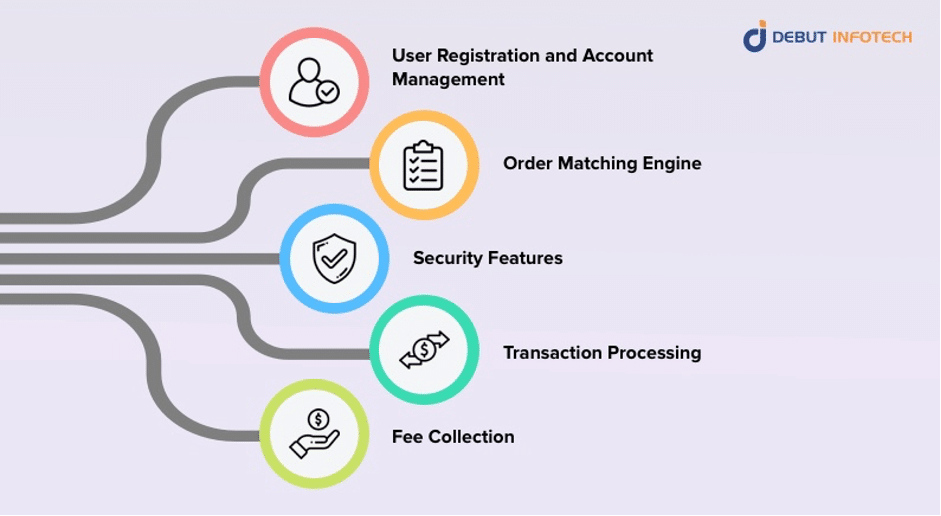
The white label crypto exchange software has become an important tool for businesses looking to enter the cryptocurrency market efficiently. As the engine behind a crypto exchange platform, It provides a ready-made solution that may be tailored to your company’s unique requirements. This article explores the benefits, functionality, and considerations when choosing a white label cryptocurrency exchange solution.
What is a White Label Crypto Exchange?
A white label crypto exchange is a pre-built platform provided by a development company that can be branded and customised by the purchasing business. This type of software includes core functionalities such as user registration, account management, order matching, security features, transaction processing, and fee collection. By leveraging a white label solution, businesses can avoid the time consuming and expensive process of developing an exchange from scratch.
Advantages of White Label Crypto Exchange Software
Choosing a white label cryptocurrency exchange offers numerous advantages, particularly for businesses with limited budgets and small teams. Here are some key benefits:
- Cost-Effective: White label solutions are significantly more affordable than developing a crypto exchange in-house. This makes it an attractive option for startups and small to mid-sized businesses.
- Quick Deployment: These solutions can be deployed quickly, allowing businesses to launch their platforms within a short timeframe. This speed to market is essential in the fast-paced crypto industry.
- Time-Saving: The development process for a custom exchange can take months or even years.You may introduce your platform with a white label solution in a matter of weeks.
- Comprehensive Features: White label crypto exchange software typically includes all the necessary features required to run a successful exchange, such as trading engine, wallet integration, KYC/AML procedures, and more.
- Security: Reputable white label suppliers safeguard user data and digital assets with strong security protocols, guaranteeing the integrity and safety of your platform. White label platforms ensure the security of customer dollars and data with built-in security features like SSL encryption, two-factor authentication, and secure wallet integration.
- Scalability: With your business growth, white label solutions can be scaled to increase more traffic and transaction volumes without compromising performance.
- Liquidity Management: These platforms often include tools to manage liquidity effectively, ensuring smooth trading experiences with minimal price slippage.
Key Features of a White Label Cryptocurrency Exchange

A white label cryptocurrency exchange software package typically includes the following core features:
- User Registration and Account Management: Streamlined processes for onboarding new users and managing their accounts.
- Order Matching Engine: Efficient algorithms to match buy and sell orders in real-time.
- Security Features: Advanced security measures such as two-factor authentication, encryption, and cold storage of digital assets.
- Transaction Processing: Reliable systems for processing trades, deposits, and withdrawals.
- Fee Collection: Automated mechanisms to calculate and collect trading fees.
Choosing the Right White Label Solution
When selecting a white label crypto exchange software, it is crucial to consider the following factors:
- Provider Reputation: Ensure the provider has a proven track record and positive reviews in the cryptocurrency market.
- Customization Options: Make sure there is enough flexibility available in the program to match your brand and your company’s needs.
- Support Services: Verify whether the supplier provides specialised maintenance and customer assistance to help with any technical problems.
- Security Measures: Verify if the program has robust security measures in place to fend against online threats and hacker attempts.
- Additional Features: Evaluate any extra features offered by the provider, such as liquidity channels, CRM capabilities, and payment processing tools.
Implementing a White Label Crypto Exchange
Implementing a white label crypto exchange involves several steps to ensure a smooth launch and operation of your platform:
- Research and Selection: Conduct thorough research to find the reputable white label providers. Select the one that best meets your needs, after evaluating their offerings.
- Customization: Work with the provider to customise the platform according to your branding and functional requirements. This may include adding your logo, adjusting the user interface, and configuring specific features.
- Testing: Make sure all features are operational and there are no security flaws by extensively testing the platform before going live.
- Launch: Once testing is complete and any necessary adjustments have been made, launch your exchange. Promote it through various channels to attract users and start trading.
- Ongoing Management: Maintain optimal functioning by regularly checking on the platform’s performance, fixing any problems that crop up, and applying updates as required.
What is the Cost of White Label Crypto Exchanges?
White label crypto exchanges are generally more cost-effective than building an in-house platform from scratch.However, depending on the features and services your selected white label provider offers, the overall pricing may differ significantly.
Base Costs and Additional Services
The basic white label package typically covers the core functionalities needed for a cryptocurrency exchange, but it might lack some essential services. For example, many white label solutions do not include dedicated customer support. This means you will likely need to hire support staff to handle client queries and issues, which adds to your overall expenses.
Key Cost Factors to Consider
- Liquidity Channels: Adequate liquidity is crucial for a seamless trading experience. Some white label providers include basic liquidity options, but advanced liquidity channels might come at an extra cost.
- Security Measures: While standard security features are included, enhanced security protocols such as advanced encryption, multi-signature wallets, and regular security audits may require additional investment.
- CRM Capabilities: Customer Relationship Management (CRM) tools are essential for managing user interactions and maintaining client relationships. Comprehensive CRM functionalities might not be part of the basic package and could necessitate extra spending.
- Additional Features: Advanced trading features, multi-currency support, and integration with third-party services can also drive up costs. These features are often crucial for offering a competitive and fully functional exchange platform.
Pricing Range
The cost for a white label crypto exchange can range significantly. Basic packages might start in the lower five-figure range, but for all-inclusive solutions with advanced features and services, prices can escalate to between $8,000 and $14,000 per month. This variation depends on the complexity and comprehensiveness of the features you choose to implement.
Balancing Costs and Features
Finding the right balance between investing in a comprehensive white label solution and sourcing certain tools independently requires careful consideration and research. Here are some strategies to manage costs effectively:
- Evaluate Your Needs: Identify the critical features and services essential for your exchange. Prioritise these in your white label package and consider sourcing secondary tools separately if it’s more cost-effective.
- Freelance and Outsourcing: For services like customer support or advanced CRM systems, hiring freelancers or outsourcing these functions can be more economical than opting for an all-inclusive white label package.
- Incremental Upgrades: Start with a basic package and gradually upgrade your features as your platform grows. This approach helps in managing initial costs and allows for scalability based on your exchange’s performance and user base expansion.
The Future of White Label Crypto Exchanges
The future of white label crypto exchanges looks promising as technology continues to evolve. New advancements in blockchain and digital asset management are expected to enhance the capabilities of white label solutions, making them even more efficient and user-friendly. Additionally, the growing popularity of no-coding solutions is likely to simplify the process of launching and managing a crypto exchange.
In the ever changing bitcoin sector, white label solutions will continue to be a competitive advantage for small businesses compared to in-house development. As new features and improvements are introduced, the gap between white label and custom-built exchanges may continue to widen, further solidifying the position of white label solutions as the go-to choice for aspiring crypto exchange platforms.
A white label crypto exchange offers essential features and advanced functionalities that cater to the growing demands of the cryptocurrency market. These platforms enable traders to execute transactions securely and efficiently, providing a solid foundation for businesses to thrive in the cryptocurrency niche. Let’s explore the different types of exchanges available within white label solutions:
Centralised Crypto Exchange
A centralised cryptocurrency exchange operates under the management of a central authority that oversees the trading process between buyers and sellers. This model offers extensive security measures, ensuring user assets are protected. Users have complete control over their private keys, providing an additional layer of safety.
Decentralised Crypto Exchange
Peer-to-peer transactions between users are made possible through decentralised exchanges (DEX), which function without a central authority. This model reduces the risk of hacks and fraudulent activities by ensuring that transactions are both secure and anonymous. DEX platforms prioritise user privacy and security.
Hybrid Crypto Exchange
Hybrid crypto exchanges combine the features of both centralised and decentralised models. This approach offers traders continuous liquidity, fast transaction speeds, and enhanced privacy. By merging the best aspects of both types, hybrid exchanges optimize the trading experience and cater to a broader range of user preferences.
P2P Crypto Exchange
Peer-to-peer (P2P) crypto exchanges enable direct trading between users without intermediaries. This model often includes an escrow protection mechanism to ensure secure transactions. P2P exchanges help traders save on transaction costs and reduce processing times, making trading more efficient and cost-effective.
DeFi Exchange
Decentralised Finance (DeFi) exchanges emphasise complete decentralisation, allowing users to swap various cryptocurrencies across different blockchain networks. DeFi platforms support liquidity pools, crypto lending, and other financial services, fostering a comprehensive and flexible trading environment.
Implementing White Label Solutions for Your Crypto Exchange
When deciding to implement a white label crypto exchange, consider the following steps to ensure success:
- Choose a Reputable Provider: Select a white label provider by looking at the strong track record and positive client reviews. Their experience and reliability are crucial for the success of your platform.
- Focus on Security: Ensure that the white label solution includes robust security measures. Regular audits and continuous monitoring can further enhance your platform’s safety.
- Customization: Work with your provider to customise the platform according to your specific needs. This includes branding, interface design, and additional features that align with your business goals.
- Compliance: Stay compliant with relevant regulations in your target markets. Integrate necessary KYC (Know Your Customer) and AML (Anti-Money Laundering) protocols to meet legal requirements.
- User Education: Provide resources such as tutorials and customer support to help users navigate your platform. Educated users are more likely to engage with and remain loyal to your exchange.
- Marketing and Promotion: To draw users to your platform, develop a marketing strategy. To improve visibility and user engagement, make advantage of influencer partnerships, social media, and SEO.
Conclusion
By understanding what a white label crypto exchange is and how to choose the right software, you can focus on growing your business and thriving in the competitive cryptocurrency landscape. White label solutions provide a streamlined and cost-effective way to enter the market, allowing you to concentrate on expansion and success.
In the fast-paced world of cryptocurrency, businesses need a reliable partner to help them thrive. That’s where Debut Infotech comes in – a trusted White Label Cryptocurrency Exchange Development Company with a proven track record of delivering high-performance exchange solutions. With expertise spanning centralised, decentralised, hybrid, P2P, escrow, OTC, and derivative exchange development, Debut Infotech’s skilled blockchain developers create customised platforms that meet the unique needs of their clients.
By leveraging Debut Infotech’s white label solutions, businesses can quickly and cost-effectively enter the cryptocurrency market, without compromising on security, scalability, or features. Whether you’re looking to expand your offerings or establish a new exchange, Debut Infotech’s expertise and cutting-edge technology make them the ideal partner for success. By understanding what a white label crypto exchange is and how to choose the right software, you can focus on growing your business and thriving in the competitive cryptocurrency landscape. White label solutions provide a streamlined and cost-effective way to enter the market, allowing you to concentrate on expansion and success.
